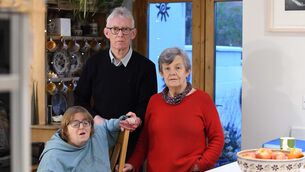Nightmare voyage to dream island

WHEN John Wain was on the nightshift, everybody waited for the call. He could see the black ocean from his window, out of which a boat or two or even five might emerge at any minute carrying a desperate cargo.
The temperature on Lesbos drops as low as five degrees at night, but a savage wind chill whips in from the sea. It’s often as cold as the winters through which Wain grew up in his native Cork.












